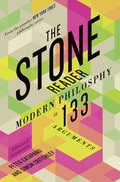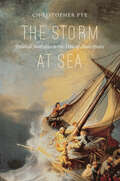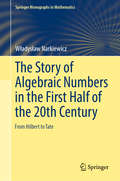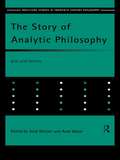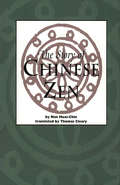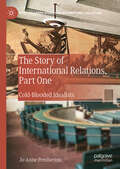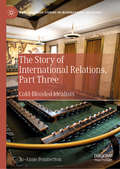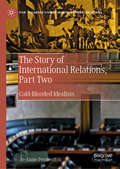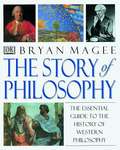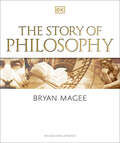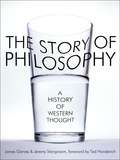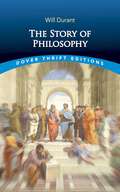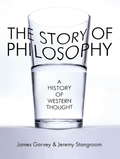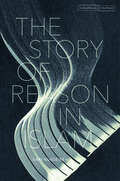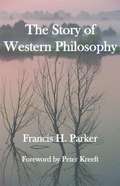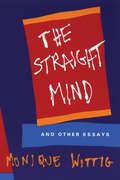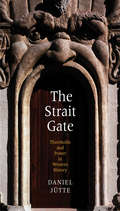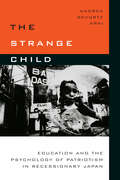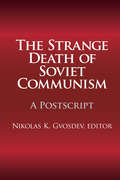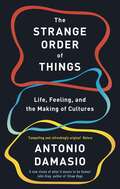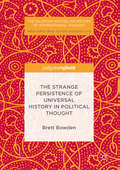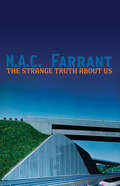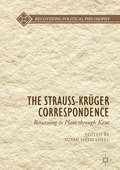- Table View
- List View
The Stone Reader: Modern Philosophy in 133 Arguments
by Simon Critchley Peter CatapanoA timeless volume to be read and treasured, The Stone Reader provides an unparalleled overview of contemporary philosophy. Once solely the province of ivory-tower professors and college classrooms, contemporary philosophy was finally emancipated from its academic closet in 2010, when The Stone was launched in The New York Times. First appearing as an online series, the column quickly attracted millions of readers through its accessible examination of universal topics like the nature of science, consciousness and morality, while also probing more contemporary issues such as the morality of drones, gun control and the gender divide. Now collected for the first time in this handsomely designed volume, The Stone Reader presents 133 meaningful and influential essays from the series, placing nearly the entirety of modern philosophical discourse at a reader’s grasp. The book, divided into four broad sections—Philosophy, Science, Religion and Morals, and Society—opens with a series of questions about the scope, history and identity of philosophy: What are the practical uses of philosophy? Does the discipline, begun in the West in ancient Greece with Socrates, favor men and exclude women? Does the history and study of philosophy betray a racial bias against non-white thinkers, or geographical bias toward the West? These questions and others form a foundation for readers as the book moves to the second section, Science, where some of our most urgent contemporary philosophical debates are taking place. Will artificial intelligence compromise our morality? Does neuroscience undermine our free will? Is there is a legitimate place for the humanities in a world where science and technology appear to rule? Should the evidence for global warming change the way we live, or die? In the book’s third section, Religion and Morals, we find philosophy where it is often at its best, sharpest and most disturbing—working through the arguments provoked by competing moral theories in the face of real-life issues and rigorously addressing familiar ethical dilemmas in a new light. Can we have a true moral life without belief in God? What are the dangers of moral relativism? In its final part, Society, The Stone Reader returns to its origins as a forum to encourage philosophers who are willing to engage closely, critically and analytically with the affairs of the day, including economic inequality, technology and racial discrimination. In directly confronting events like the September 11 attacks, the killing of Trayvon Martin, the Sandy Hook School massacre, the essays here reveal the power of philosophy to help shape our viewpoints on nearly every issue we face today. With an introduction by Peter Catapano that details the column’s founding and distinct editorial process at The New York Times, and prefatory notes to each section by Simon Critchley, The Stone Reader promises to become not only an intellectual landmark but also a confirmation that philosophy is, indeed, for everyone.
The Storm at Sea: Political Aesthetics in the Time of Shakespeare
by Christopher PyeThe Storm at Sea: Political Aesthetics in the Time of Shakespeare counters a tradition of cultural analysis that judges considerations of aesthetic autonomy in the early modern context to be either anachronistic or an index of political disengagement. Pye argues that for a post-theocratic era in which the mise-en-forme of the social domain itself was for the first time at stake, the problem of the aesthetic lay at the very core of the political; it is precisely through its engagement with the question of aesthetic autonomy that early modern works most profoundly explore their relation to matters of law, state, sovereignty, and political subjectivity.Pye establishes the significance of a “creationist” political aesthetic—at once a discrete historical category and a phenomenon that troubles our familiar forms of historical accounting—and suggests that the fate of such an aesthetic is intimately bound up with the emergence of modern conceptions of the political sphere.The Storm at Sea moves historically from Leonardo da Vinci to Thomas Hobbes; it focuses on Shakespeare and English drama, with chapters on Hamlet, Othello, A Winter’s Tale, and The Tempest, as well as sustained readings of As You Like It, King Lear, Thomas Kyd’s Spanish Tragedy, and Christopher Marlowe’s Doctor Faustus. Engaging political thinkers such as Carl Schmitt, Giorgio Agamben, Claude Lefort, and Roberto Esposito, The Storm at Sea will be of interest to political theorists as well as to students of literary and visual theory.
The Story of Algebraic Numbers in the First Half of the 20th Century: From Hilbert to Tate (Springer Monographs in Mathematics)
by Władysław NarkiewiczThe book is aimed at people working in number theory or at least interested in this part of mathematics. It presents the development of the theory of algebraic numbers up to the year 1950 and contains a rather complete bibliography of that period. The reader will get information about results obtained before 1950. It is hoped that this may be helpful in preventing rediscoveries of old results, and might also inspire the reader to look at the work done earlier, which may hide some ideas which could be applied in contemporary research.
The Story of Analytic Philosophy: Plot and Heroes (Routledge Studies in Twentieth-Century Philosophy #Vol. 1)
by Anat Matar Anat BiletzkiThis unique collection looks at analytic philosophy in its historical context. Prominent philosophers discuss key figures, including Russell and Wittgenstein, methods and results in analytic philosophy to present its story. This volume assesses the challenge posed by changing cultural and philosophical trends and movements.
The Story of Chinese Zen
by Thomas Cleary Nan Huai-ChinThe development of Zen in China is really the story of the flourishing of Chinese philosophy, arts and literature beginning as far back as the Han Dynasty and earlier. Master Nan Huai-Chin offers an engaging chronicle of both in this groundbreaking work.
The Story of Chinese Zen
by Thomas Cleary Nan Huai-ChinThe development of Zen in China is really the story of the flourishing of Chinese philosophy, arts and literature beginning as far back as the Han Dynasty and earlier. Master Nan Huai-Chin offers an engaging chronicle of both in this groundbreaking work.
The Story of International Relations, Part One: Cold-Blooded Idealists (Palgrave Studies in International Relations)
by Jo-Anne PembertonThis book is the first volume in a trilogy that traces the development of the academic subject of International Relations, or what was often referred to in the interwar years as International Studies. This first volume takes on the origins of International Relations, beginning with the League of Nations and the International Studies Conference in Berlin in 1928 and tracing its development through the Paris Peace Conference, the quest for cooperation in the Pacific, the Institute of Pacific Relations and lessons from Copenhagen, Shanghai and Manchuria. This project is an impressive and exhaustive consideration of the evolution of IR and is aptly published in celebration of the discipline's centenary.
The Story of International Relations, Part Three: Cold-Blooded Idealists (Palgrave Studies in International Relations)
by Jo-Anne PembertonThis book is the third volume in a trilogy that traces the development of the academic subject of International Relations, or what was often referred to in the interwar years as International Studies. This volume explores how International Relations progressed through the 20th century looking specifically at World War II, from the looming world war to the post-War reconstruction in Europe. This one of a kind project takes on the task of reviewing the development of IR, aptly published in celebration of the discipline’s centenary.
The Story of International Relations, Part Two: Cold-Blooded Idealists (Palgrave Studies in International Relations)
by Jo-Anne PembertonThis book is the second volume in a trilogy that traces the development of the academic subject of International Relations, or what was often referred to in the interwar years as International Studies. In this volume, the author begins with the 1932 Mission to China and conference in Milan, examines the International Studies Conference, reviews the Hoover Plan, the MacDonald Plan, the fate of the World Disarmament Conference, and the League of Nations’ role in the discipline. This one of a kind project takes on the task of reviewing the development of IR, aptly published in celebration of the discipline’s centenary.
The Story of Philosophy
by Bryan MageePhilosophy is a subject that influences many aspects of our lives and our understanding of our experiences, yet it can seem dauntingly inaccessible. Unrivaled in its clarity and insight, The Story of Philosophy is an approachable guide to the history of ideas and thinking. History of Western Philosophy: Professor Bryan Magee traces 2,500 years of Western philosophy from the Ancient Greeks to modern thinkers. His deep appreciation of the subject and grasp of its complexities have enabled him to produce a book accessible to the general reader, yet substantial enough for the more experienced student. What Is Philosophy?: Philosophers question the fundamental principles underlying all knowledge and existence. Among the important philosophical issues that The Story of Philosophy addresses are questions such as "What is being?" and "Can the existence of God be proved?" Covering every major philosopher from Plato to Popper via Saint Augustine, Locke, and Nietzsche, Bryan Magee opens up the world of ideas in a way that is easily understood by everyone. Additional background information puts the philosophers in historical context with the influences that shaped their lives and work. Comprehensive, highly visual, and filled with penetrating observations, The Story of Philosophy is the essential guide to this fascinating subject.
The Story of Philosophy
by Bryan MageeThis essential guide to philosophy includes thoughts on our modern society, exploring science and democracy, and posing the question: where do we go from here? Easy-to-understand text is accompanied by works of art and artifacts from history, as the big ideas and important thinkers are introduced through time. Famous quotes are highlighted, and the sidebars discuss other ideas or key works to include extra context around the theories and people. Celebrate the world's most revolutionary concepts and understand how these ideas continue to shape our world. Develop your own perspectives and explore relevant issues such as modern logic and religion with this wonderfully comprehensive illustrated guide. In a world of evolving ideas, this book is a fantastic resource to revisit again and again.
The Story of Philosophy
by Jeremy Stangroom James GarveyThe Story of Philosophy sees philosophy for what it is: a passionate, exhilarating quest for human understanding that cannot be reduced to dry categories or simple definitions. Accessible writing, brilliant scholarship and over 150 colour illustrations combine to form a richly informative and highly entertaining work of narrative history.Packed with intriguing anecdotes and fascinating detail, James Garvey and Jeremy Stangroom bring us face to face with the most important philosophers in western history. The story begins with the Ancient Greeks, Socrates, Plato and Aristotle, great thinkers who set the philosophical agenda to this day. It continues with Greek and Roman philosophers--slaves and emperors who found consolation in deep thoughts about life and death--and moves on to the religious thinkers of the Middle Ages. The origins of modern science, politics, and morality are examined, alongside theories of knowledge, logic, mind and matter. Along the way, you'll discover Descartes' evil demon, Locke on the limits of knowledge, Rousseau and Hobbes on human nature, Hume's scepticism, Kant on duty, Nietzsche's Superman, Marx on class struggle, Russell's logic, Wittgenstein on meaning, Sartre on bad faith, Foucault's take on power, and much more.Rigorous, refreshingly free of academic jargon, and highly accessible, this is the ideal introduction for anyone who wants to gain a new perspective on philosophy's deepest mysteries and most intriguing discoveries.
The Story of Philosophy (Dover Thrift Editions: Philosophy)
by Will DurantPulitzer Prize–winning author Will Durant chronicles the lives and ideas of several key philosophical thinkers throughout history in this informative and eminently readable text. Beginning with Socrates and Plato and concluding with Friedrich Nietzsche, with twelve other prominent philosophers in between, the author builds a history of philosophy by showing how each thinker’s ideas informed and influenced the next generation. An essential read for anyone fascinated by the development of Western philosophy.
The Story of Philosophy: A History of Western Thought
by Jeremy Stangroom James GarveyThe Story of Philosophy sees philosophy for what it is: a passionate, exhilarating quest for human understanding that cannot be reduced to dry categories or simple definitions. It's a story with plot twists, a murder, accidental discoveries, disastrous love affairs, geniuses, idiots, monks, and vagabonds. At the heart of it all are the ideas and obsessions that have captured great thinkers from the very beginning. Packed with intriguing anecdotes and fascinating detail, James Garvey and Jeremy Stangroom bring us face to face with the most important philosophers in western history. Rigorous, refreshingly free of academic jargon, and highly accessible, this is the ideal introduction for anyone who wants to gain a new perspective on philosophy's biggest thoughts.
The Story of Philosophy: A History of Western Thought
by Jeremy Stangroom James GarveyThe Story of Philosophy sees philosophy for what it is: a passionate, exhilarating quest for human understanding that cannot be reduced to dry categories or simple definitions. It's a story with plot twists, a murder, accidental discoveries, disastrous love affairs, geniuses, idiots, monks, and vagabonds. At the heart of it all are the ideas and obsessions that have captured great thinkers from the very beginning. Packed with intriguing anecdotes and fascinating detail, James Garvey and Jeremy Stangroom bring us face to face with the most important philosophers in western history. Rigorous, refreshingly free of academic jargon, and highly accessible, this is the ideal introduction for anyone who wants to gain a new perspective on philosophy's biggest thoughts.
The Story of Reason in Islam
by Sari NusseibehIn The Story of Reason in Islam, leading public intellectual and political activist Sari Nusseibeh narrates a sweeping intellectual history--a quest for knowledge inspired by the Qu'ran and its language, a quest that employed Reason in the service of Faith. Eschewing the conventional separation of Faith and Reason, he takes a fresh look at why and how Islamic reasoning evolved over time. He surveys the different Islamic schools of thought and how they dealt with major philosophical issues, showing that Reason pervaded all disciplines, from philosophy and science to language, poetry, and law. Along the way, the best known Muslim philosophers are introduced in a new light. Countering received chronologies, in this story Reason reaches its zenith in the early seventeenth century; it then trails off, its demise as sudden as its appearance. Thereafter, Reason loses out to passive belief, lifeless logic, and a self-contained legalism--in other words, to a less flexible Islam. Nusseibeh's speculations as to why this occurred focus on the fortunes and misfortunes of classical Arabic in the Islamic world. Change, he suggests, may only come from the revivification of language itself.
The Story of Western Philosophy, 2nd Edition
by Francis H. ParkerThis book is a guide to the interpretation of the history of Western philosophy. It is designed especially for use in a course in the history of philosophy. It may also prove useful for other purposes, such as an historical introduction to philosophy or a comprehensive review of the history of philosophy or just as a help to the general reader trying to make some sense out of the history of Western philosophy.
The Straight Mind: And Other Essays
by Monique WittigThese political, philosophical, and literary essays mark the first collection of theoretical writing from the acclaimed novelist and French feminist writer Monique Wittig.&“Among the most provocative and compelling feminist political visions since The Second Sex. These essays represent the radical extension of de Beauvoir&’s theory, its unexpected lesbian future. Wittig&’s theoretical insights are both precise and far-reaching, and her theoretical style is bold, incisive, even shattering.&”—Judith Butler, Johns Hopkins University
The Strait Gate
by Daniel JütteExploring a chapter not yet probed in the cultural history of the West, The Strait Gate demonstrates how doors, gates, and related technologies such as the key and the lock have shaped the way we perceive and navigate the domestic and urban spaces that surround us in our everyday lives. Jütte reveals how doors have served as sites of power, exclusion, and inclusion--and, by extension, as metaphors for salvation--in the course of Western history. This book makes it clear that doors, more than any other parts of the house, are the objects onto which we project our ideas of and anxieties about security, privacy, and shelter. Without doors, of course, houses could not exist. But even though we each walk through doorways well over a hundred times a day, we typically pay little attention to the doors we encounter. We regard them simply as a means of entering or leaving a building or room. Yet when our doors stop working as they should--when we find that we cannot lock or open them, for instance--we react with discomfort and anxiety. Drawing on a wide range of archival, literary, and visual sources, as well as on research literature across various disciplines and languages, Jütte pays particular attention to the history of the practices that have developed over the centuries in order to handle and control doors in everyday life.
The Strange Child: Education and the Psychology of Patriotism in Recessionary Japan
by Andrea Gevurtz AraiThe Strange Child examines how the Japanese financial crisis of the 1990s gave rise to "the child problem," a powerful discourse of social anxiety that refocused concerns about precarious economic futures and shifting ideologies of national identity onto the young. Andrea Arai's ethnography details the different forms of social and cultural dislocation that erupted in Japan starting in the late 1990s. Arai reveals the effects of shifting educational practices; increased privatization of social services; recessionary vocabulary of self-development and independence; and the neoliberalization of patriotism. Arai argues that the child problem and the social unease out of which it emerged provided a rationale for reimagining governance in education, liberalizing the job market, and a new role for psychology in the overturning of national-cultural ideologies. The Strange Child uncovers the state of nationalism in contemporary Japan, the politics of distraction around the child, and the altered life conditions of--and alternatives created by--the recessionary generation.
The Strange Death of Soviet Communism: A Postscript (The National Insterest)
by Nikolas GvosdevThe collapse of communism marked the close of an era of world history. What took place in the Soviet Union between 1917 and 1991, in the eyes of its proponents, constituted a "great experiment" in the application of new modes of organization to social life, the largest such experiment in history. The Strange Death of Soviet Communism, which first appeared as a special issue of The National Interest, brings together leading scholars of Soviet history, who show why the experiment failed and how it has destroyed the laboratory of socialist utopias.Francis Fukuyama considers the role of long-term social and intellectual modernization while Vladimir Kontorovich examines the related factor of economic stagnation. Myron Rush then analyzes the accidental and precedent-breaking accession and leadership of Gorbachev. Charles Fairbanks looks at the more general factors of change and rigidity within communist political culture. Chapters by Peter Reddaway and Stephen Sestanovich conclude this section by assessing respectively the role of internal pressure from Soviet citizens and external pressure from the West. The next chapters deal with why the West was surprised by the communist collapse. This involves a critique of Western Sovietology both for its scholarly failures and its ideological prejudices. Here, Peter Rutland and William Odom deal with social science interpretations of the Soviet Union while Robert Conquest and Richard Pipes reflect on historians' readings of Soviet history. Martin Malia then offers a comparative assessment of both. In the third section Irving Kristol and Nathan Glazer discuss communism in relation to the intellectuals in the West.Although the authors are united in their anti-communist stance, the volume is diverse in its perspectives and assessments of Soviet communism. Taken together, these contributions show that the debate on the legacy of communism and a subsequent rethinking of modern history is just beginnin
The Strange Order Of Things: Life, Feeling and the Making of Cultures
by Antonio Damasio'Damasio undertakes nothing less than a reconstruction of the natural history of the universe ... [A] brave and honest book' The New York Times Book ReviewThe Strange Order of Things is a pathbreaking investigation into homeostasis, the condition of that regulates human physiology within the range that makes possible not only survival but also the flourishing of life. Antonio Damasio makes clear that we descend biologically, psychologically and even socially from a long lineage that begins with single living cells; that our minds and cultures are linked by an invisible thread to the ways and means of ancient unicellular existence and other primitive life-forms; and that inherent in our very chemistry is a powerful force, a striving toward life maintenance that governs life in all its guises, including the development of genes that help regulate and transmit life.The Strange Order of Things is a landmark reflection that spans the biological and social sciences, offering a new way of understanding the origins of life, feeling and culture.
The Strange Persistence of Universal History in Political Thought
by Brett BowdenThis book explores and explains the reasons why the idea of universal history, a form of teleological history which holds that all peoples are travelling along the same path and destined to end at the same point, persists in political thought. Prominent in Western political thought since the middle of the eighteenth century, the idea of universal history holds that all peoples can be situated in the narrative of history on a continuum between a start and an end point, between the savage state of nature and civilized modernity. Despite various critiques, the underlying teleological principle still prevails in much contemporary thinking and policy planning, including post-conflict peace-building and development theory and practice. Anathema to contemporary ideals of pluralism and multiculturalism, universal history means that not everyone gets to write their own story, only a privileged few. For the rest, history and future are taken out of their hands, subsumed and assimilated into other people's narrative.
The Strange Truth About Us
by M.A.C. FarrantThis tell-all book by M.A.C. Farrant, whom Publishers Weekly has celebrated as "a brave iconoclast" and whose work the Globe & Mail has said "bristles with moral fury ... at the absurdities of our accelerated age and a great dose of laugh-out-loud humour," offers her readers nothing less than The Strange Truth About Us.A three-part novel-length work of prose fragments, snippets, questions, speculations, and meditations, by turns philosophical, dark, comedic, and lyrical, it attempts to imagine a multitude of possible futures for our garrisoned world."Annotations About an Absence" is a series of 115 numbered annotations to the day-long ruminations of a retired couple living in a gated community attempting to create an imaginary novel in which they express their fears about the future: "We attempt to express the universal confusion of mind that is the main feature of contemporary life. Which is? We are afraid.""Woman Records Brief Notes Regarding Absence" is written as a series of notes to these annotations, providing (in the utterly blank spirit of transparency) a running satiric narrative on the project. Each of these "notes" is written as if it were a description of a late-night TV movie or the content of a wet Jehovah's Witness pamphlet left on a woman's doorstep that has taken hold of her mind."Other Prose Surrounding Absence" comprises twenty-seven prose pieces that take aim at a globalized world bludgeoned by the threat of "end times"-climate change, species extinction, pandemics, and really bad politics-that seem designed insofar as we are able to retain our status as "individuals."Unique in style and approach, engaging, enigmatic, controversial, and delightful, this book is an attempt to prick the bubble of our complacency in the face of the "awful atrocity" we've made for ourselves.
The Strauss-Krüger Correspondence
by Susan Meld ShellThis book presents the first full translation of the correspondence of Leo Strauss and Gerhard Krüger, showing for each the development of key and influential ideas, along with seven interpretative essays by leading Strauss scholars. During the early to mid-1930’s, Leo Strauss carried on an intense, and sometimes deeply personal, correspondence with one of the leading intellectual lights among Heidegger’s circle of recent students and younger associates. A fellow traveler in the effort to “return to Plato” and reject neo-Kantian conventions of the day, Krüger was also a serious student of Rudolf Bultmann and the neo-orthodox movement in which Strauss also took an early interest. During the most intense years of their correspondence, each underwent significant intellectual development: in Krüger’s case, through a penetrating series of studies of Kant and Descartes, respectively, ultimately leading to Krüger’s conversion to Catholicism; and, in Strauss’s case, through the complex stages of what he subsequently called his “reorientation,” involving what he for the first time calls “political philosophy.” Readers interested in tracing the development of Strauss’s thoughts regarding a theological alternative that he found helpfully challenging—if not ultimately compelling—will find this correspondence to be an accessible point of entry.
